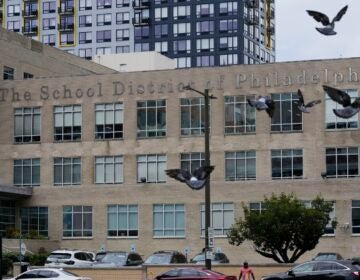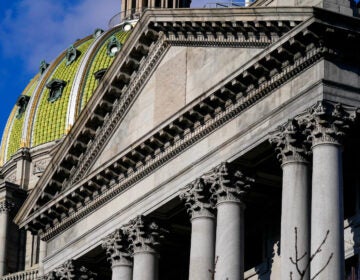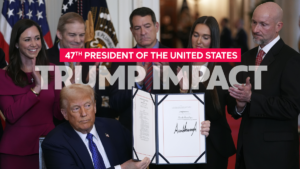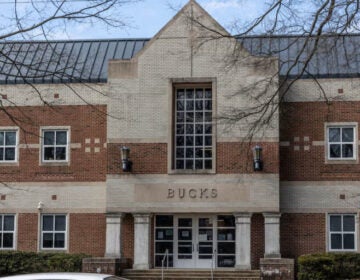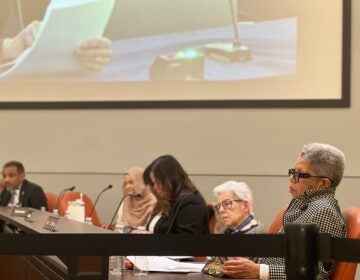Philadelphia schools could lose millions as Trump administration withholds federal money
States around the country were expecting to receive already-approved federal education funding by July 1. The Department of Education announced a review at the 11th hour.

President Donald Trump waves as he arrives at Joint Base Andrews, Md., after visiting a migrant detention center in Ochopee, Fla., Tuesday, July 1, 2025. (AP Photo/Evan Vucci)
From Philly and the Pa. suburbs to South Jersey and Delaware, what would you like WHYY News to cover? Let us know!
Morgyn Yates, director of K-12 programs at Sunrise of Philadelphia, said her organization relies on federal funds to provide free, critical services — including academic support, social-emotional learning and a safe place to spend time after class — to students in 16 different schools across the city.
“We’re giving them opportunities to have more intensive and immersive learning opportunities,” Yates said.
Now, those opportunities might be gone.
President Donald Trump’s administration announced this week that it would not release nearly $7 billion in federal education grants that were expected to flow to states on Tuesday, citing a funding review. Officials did not give a clear timeline on when the evaluation will be completed.
“Given the change in Administrations, the Department is reviewing the FY 2025 funding for the [Title I-C, II-A, III-A, IV-A, IV-B] grant program(s),” a Department of Education statement reads. “Decisions have not yet been made concerning submissions and awards for this upcoming academic year.”
In March, Congress authorized the billions in education grants now held in limbo through a continuing resolution, which President Trump signed into law. Typically, after Congress appropriates those funds, the DOE sends states allocation tables of the exact amounts they’ll receive from each grant program, and gives them access to those dollars by July 1. The American Federation of School Administrators called the move to withhold funds months after their approval “unprecedented.”
Pennsylvania is missing over $200 million, about 13% of the state’s overall federal K-12 education allowance.
Among the withheld funds are 21st Century Community Learning Centers grants, established through Title IV-B — that money powers Sunrise and many other Out-of-School Time programs for Philadelphia students.
Other funding streams address teacher recruitment and training, English-learning instruction and support, curriculum enhancement and more. All of them are among the programs the Trump administration has proposed eliminating in its fiscal year 2026 budget request.
How will the funding cuts hurt Philadelphia schools?
While the School District of Philadelphia did not provide the exact amounts of funding being withheld, state records show that in 2024, the district received $9.13 million through Title II-A (aimed at recruiting and training teachers, principals and staff); $4.6 million through Title III-A (focused on language instruction for English-learning and immigrant students); and $13.2 million through Title IV-A (a broader funding stream including goals related to academic enrichment, technology use, improving school conditions and student well-being).
Community organizations and charter schools across the city, which operate OST programs, were set to receive a combined total of over $12.6 million in 21st CCLC grants through Title IV-B, records show.
Statewide, Pennsylvania’s Department of Education said that an estimated $11 million via Title I-C — which funds regional offices aimed at supporting migrant students, including those whose families do seasonal farmwork — and $20 million in Adult Education Basic Grants are being withheld.
In a statement made to POLITICO on Wednesday, a federal Office of Management and Budget spokesperson said, “Initial findings have shown that many of these grant programs have been grossly misused to subsidize a radical leftwing agenda.”
Robin Cooper, president of Philadelphia’s chapter of the Commonwealth Association of School Administrators, said she couldn’t square that with reality.
“I’m trying to understand what he considers a radical left-wing agenda,” Cooper said. “Is it helping economically disadvantaged [students]?”
The uncertainty comes as the district is strapped for cash. Historically underfunded and unable to raise its own revenue, Philadelphia’s school system is largely reliant on city and state funds. Federal dollars make up a significant portion, about 10% of the $4.5 billion budget. The largest segment of that 10% includes funding from Title I, which has already faced threats of elimination but was not affected by this week’s withholding.
“We’re underfunded and under-resourced as it is,” said Arthur Steinberg, president of Philadelphia Federation of Teachers. “The state is just beginning to make up for the shortfall that the courts have ruled that they had in place for years, and they can take about seven years to fill that adequacy gap.”
Calls to address staffing shortages and bolster resources for immigrant students have been front and center among demands from education advocates, parents and students this year.
In an emailed statement, Superintendent Tony Watlington said the district was monitoring the “rapidly evolving” federal developments and reaffirmed its mission to serve all students, regardless of background.
“Recent actions coming out of Washington over the past two months – including recent significant cuts to and anticipated dismantling of the U.S. Department of Education – are understandably raising concerns about impacts on the educational landscape across the country, including the School District of Philadelphia. While we navigate the evolving issues, our commitment to teaching every student will not waiver,” the statement read. “As we move forward together, we will provide periodic updates about impacts on the District and our students. We appreciate the continued partnership with our families and patience during these uncertain times.”
The state Department of Education said in a statement that they were “assessing the impact of this delay and will keep school leaders and local programs informed.”
How are Philly organizations responding?
At Sunrise, officials said they will continue their summer program. But Yates said her team is unsure whether they’ll be able to offer after-school activities in the fall. If the expected funding is withdrawn, the year-round programs are “going to close,” Yates said plainly. “They’re not going to be there.”
It’s not yet clear when the administration will make decisions or how school districts’ bottom lines will be impacted. But education leaders are sounding the alarm.
“School is starting in eight weeks, and some of the funds that are being held up are funding programs for this summer,” said Donna Cooper, executive director of Children First PA. “If the Trump administration has concerns about these federal funds, then they should examine them and put out new guidance and states can comply with that … but the idea that you’re getting rid of 21st Century Grants, which are funding after-school and summer academic enrichment programs, with one day’s notice, is really harming students and harms parents.”
Steinberg, of the Philadelphia Federation of Teachers, said his union was in talks with its national counterpart about what actions to take next.
“It’s just illegal,” Steinberg said. “It’s withholding of funds that have been approved, that are supposed to be distributed already. In particular, it targets these programs that school districts like Philadelphia really, really need.”

Get daily updates from WHYY News!
WHYY is your source for fact-based, in-depth journalism and information. As a nonprofit organization, we rely on financial support from readers like you. Please give today.


